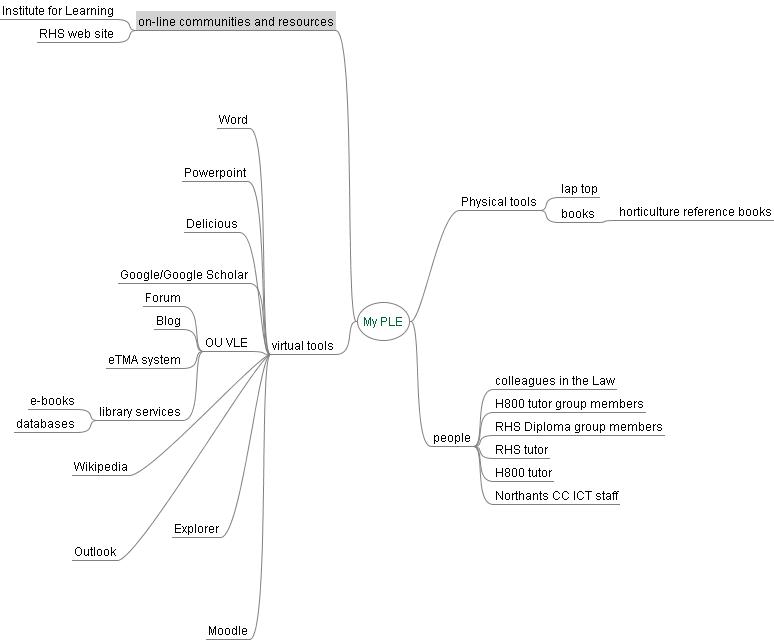I have encountered a number of new tools and technologies on this course, some of which I have adopted as useful (Delicious, blogging) and others which seem to me to have limited use (such as Twitter). In one sense I am developing a PLE - but I am perfectly happy to include the OU VLE in this.
for example, I prefer to use the OU library databases rather than Google Scholar simply because of the large number of papers that I have found on the latter that require payment to access. More often than not a search that begins on Google Scholar (because I am too lazy to log in) will end up on the library web site to get full text access.
I am not familiar with many on-line tools and the VLE has a clear benefit for me, in that it provides me with useful simple tools that do not require hours of playing to get any real benefit from them. I am not a technophile and therefore if a tool is intuitive to use and relatively simple I will use it to perform a specific task. I have very little patience with (and little time available for) anything more complex.
I think that VLE's therefore have simplicity in their favour. If I were a law student I would become very frustrated with any course that required that I identify, for myself, from hundreds of possible solutions, learn about and become expert with, a host of new tools as well as studying my subject.
The PLE argument assumes that the students are already using all the necessary tools to a high level of proficiency. However there are two difficulties with this approach. Firstly, the digital natives, that is the truly expert users of technology, do not appear to be anything like a majority as yet.
Secondly, for those who are not experts there is a risk that their PLE would be relatively impoverished and that this would reflect in their assessments. The danger here is that the grades would reflect the capacity of the Web 2.0 tools selected and not the understanding of the student of the subject in question. There is then a danger that you end up assessing something that you are not teaching - which is unfair to the students concerned.
Therefore whilst I like the concept of a Personal Learning Environment - in that it requires that you look at all of the aspects of your life that relate to or may be useful for your learning (hence the inclusion of people and books in my PLE) and clearly identify them - I have doubts about it's use in the strict sense for many students.
Perhaps the issue is the level and subject of study. For students like ourselves studying educational technology at Masters level, it may well make sense to allow the putting together of a set of independent Web 2.0 tools. However even here many of us were not familiar with such tools and would require detailed guidance.
At undergraduate level my experience of OU students is that they are not the expert 'digital natives' that the technophiles suggest. Some clearly are very capable with ICT, but for many the OU computer grant enables them to purchase their own computer for the first time. To ask them to research and structure their own PLE and learn to use those tools in addition to their studies would I think result in a very high rate of non-completion.
This would effectively outsource the 'provision' of educational technology to the students themselves with any associated costs. It also may leave them dependent on often poor support (premium rate help lines or inadequate help files), using tools with limited inter-operability (every year about half of my level 1 students don't know what a file format is - they have to submit assignments in .rtf or .doc formats and I get a wide assortment of everything but).
Other issues relate to moderation, intellectual property, data retention and defamation which I have dealt with in an earlier post.
In conclusion, I like the broad concept which I find useful. I can see it's usefulness in teaching computer science or educational technology, where the tools are part of the subject being studied, or for post graduate students. I think that the problems of support, interoperability and complexity mean that it would be a very high risk strategy for undergraduates or college students.
Those who had had fewest educational or economic advantages might well be those who were least able to create an effective PLE. As well as the digital divide we might create digital crevasses down which students could fall after accessing higher/further education.
